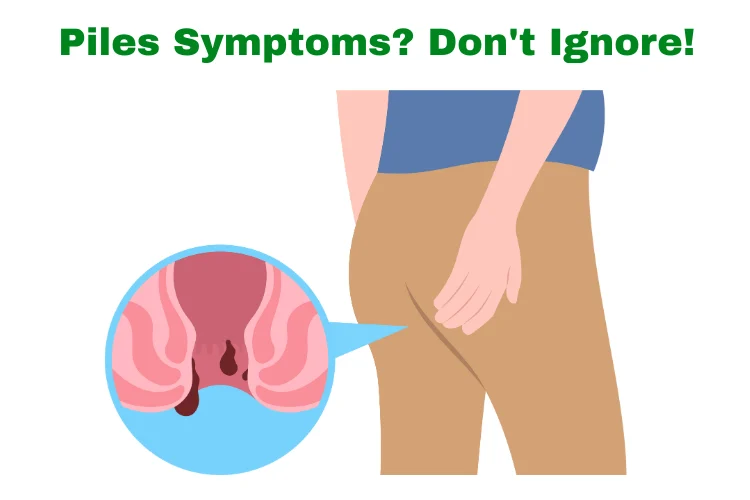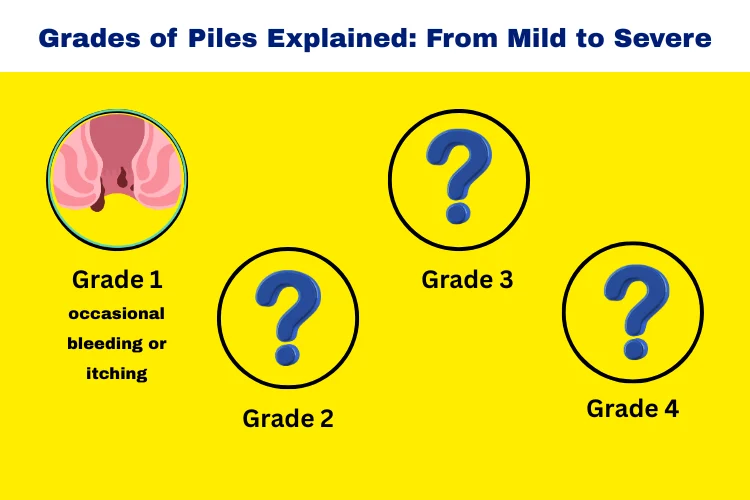Piles Pain: Piles, medically termed hemorrhoids, are formations that could cause excruciating discomfort, particularly when one is seated or passing out stool. Most people have experienced piles in their lifetime at one point or another; thus, knowing their stages, causes, and treatment options can help manage this condition very well.
The degree of piles could be as mild irritation or to an extent where one finds it difficult to engage in activities of daily living. If left unattended, this might worsen, leading to complications such as high amounts of bleeding, infection, and acute swelling. The difference from other light ailments, when to see a doctor, and taking the right form of treatment would help in managing the pile to the betterment of your life.
Understanding Piles Pain
The degree of pain caused by the piles varies depending on its severity and stage. While some may experience just mild discomfort, there are others that feel excruciating pain accompanied by other signs such as swelling and bleeding.
Stages of piles:
Stage 1: Internal hemorrhoids with no visible swollen lumps, but only occasional discomfort. Usually, there is minor bleeding when having bowel movements.
Stage 2: Prolapse occurs at each bowel movement, but they go back in. Pain and itching are usually more detectable in this stage.
Stage 3: They require manual pushing back in because these hemorrhoids are prolapsed. It is likely that this causes intense pain and even bleeding.
Stage 4: The most serious type of prolapse, permanent, with all-the-time pain and bleeding. By this stage, treatment by a doctor is normally needed.
Common Symptoms:
- Pain or discomfort during bowel movements
- Swelling or lumps around the anus
- Itching and irritation
- Bleeding during or after defecation
- Mucous discharge
- A feeling of incomplete bowel emptying
Causes of Piles Pain
Many factors contribute to the development of piles pain, including:
Chronic constipation: Stress during intestinal movements increases the pressure in the anal.
Sitting for a long time: Sitting for a long time, especially on stiff surfaces, can cause piles to cause pain.
Pregnancy: Increasing the pressure on pelvic years can cause hemorrhoids in pregnant women.
Little fiber diet: A diet with fiber deficiency increases hard stools and stress.
Overweight: excess body weight adds extra pressure on the anal veins.
Heavy lifting: Repeatedly raising heavy objects can cause stress in the lower body and can cause piles.
Best Treatment Options
Piles pain can be treated effectively with lifestyle changes, home remedies, and medical treatments.
Home Remedies:
- High-Fiber Diet: Helps soften stools and prevent constipation.Add fruits, vegetables, entire grains, and legumes.
- Hydration: Drinking plenty of water reduces strain during bowel movements and prevents constipation.
- Sitz Baths: Soaking in warm water for 15-20 minutes several times a day can ease pain and swelling.
- Cold Compress: Applying an ice pack to the affected area helps reduce swelling and numb pain.
Medical treatments:
Medications: Over-the-counter creams, ointments, and painkillers can offer temporary relief.
Minimally invasive processes:
- Rubber band ligation: A small rubber band is placed around the bleeding to cut the blood supply, causing it to shrink.
- Sclerotherapy: Injection of a chemical solution to shrink piles.
- Infrared Coagulation: Uses infrared light to shrink hemorrhagic tissue.
Surgical treatment:
- Hemorrhoidectomy: Complete to remove piles in severe cases.
- Stapled hemorrhoidopexy: a low painful process that reproduces bleeding and cuts blood supply.
When to See a Doctor
If the symptoms continue despite home treatment or deteriorate over time, contact your doctor for a correct diagnosis and medical intervention. If you seek medical help:
- You experience frequent or excessive bleeding.
- There is severe pain that does not improve with home remedies.
- Hauger is infected.
- You notice a lump that doesn’t shrink over time.
FAQs
1. What are the first signs of piles pain ?
Light discomfort, itching, and sometimes bleeding during bowel movements.
2. Can hemorrhoid pain disappear on its own?
Light cases can be solved with lifestyle changes, but in severe cases, medical treatment is required.
3. What foods should be avoided for hemorrhoids?
Spicy, processed, and low-fiber foods can destroy foods, and they should be avoided.
4. Are home medications effective for hemorrhoid pain?
Yes, diet, hydration, and sitz baths can help, but advanced cases may require medical intervention.
5. How long do hemorrhoids hurt?
The duration varies depending on the severity and treatment method; light cases can be resolved within days, while severe cases can persist for several weeks.
6. Are piles operations painful?
Modern processes are minimally invasive, and discomfort after surgery is usually controlled with the drug.
Conclusion:
Although piles pain can greatly interfere with day-to-day functioning, it can be alleviated with early intervention and lifestyle modifications. Effective management of the condition is facilitated by knowledge of the stages and available treatment options. It is essential to consult a doctor if symptoms worsen in order to prevent complications.
Keep your life from being disrupted by piles of pain. Act now by changing your lifestyle and receiving the right care!




